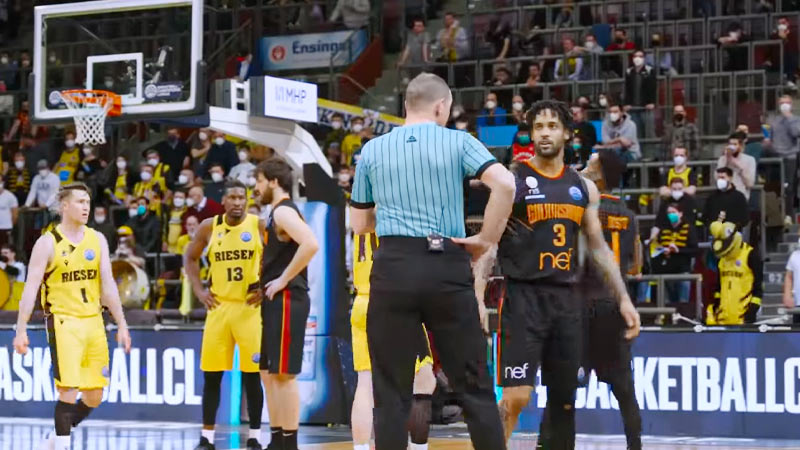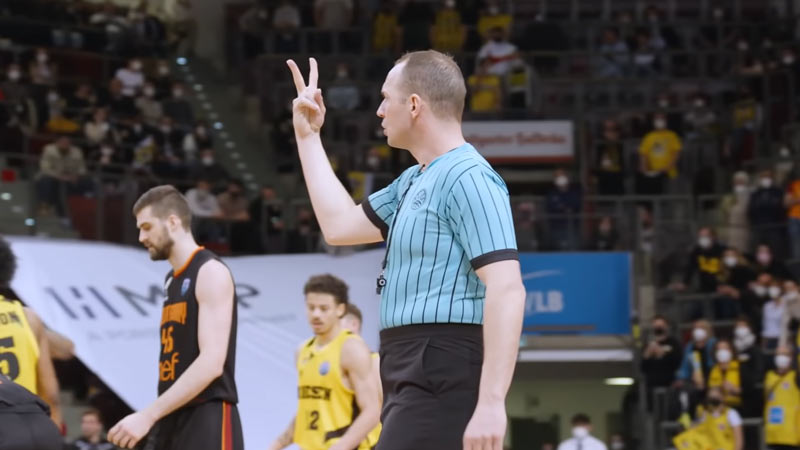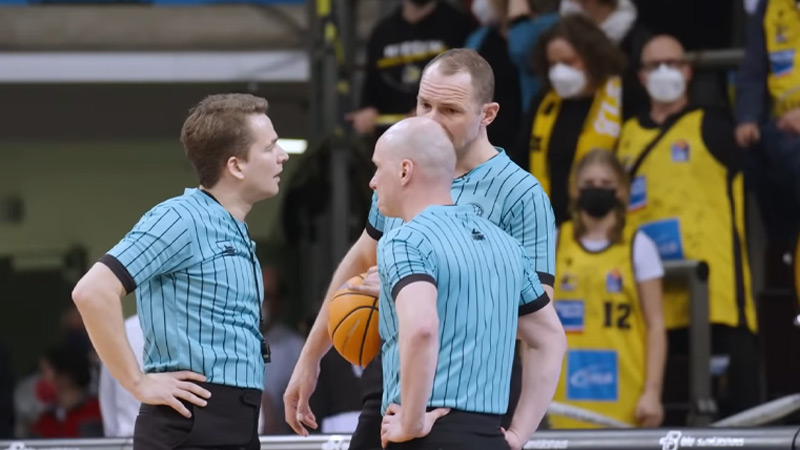Basketball referees play a crucial role in maintaining fairness and enforcing the rules of the game.
As impartial arbiters, they are responsible for making accurate and timely decisions that impact the flow and outcome of a basketball match.
In this article, we will explore the roles and responsibilities of basketball referees, the criteria to become a referee, and highlight some of the greatest referees of all time. So, get ready to dig deep into the matter in the following phases.
What Is a Basketball Referee?
A basketball referee plays a critical role in ensuring fair play and maintaining order on the basketball court.
Their main responsibility is to enforce the rules of the game, making sure that both teams adhere to the regulations set by the governing body of the sport, such as the National Basketball Association (NBA) or the International Basketball Federation (FIBA).
Referees are tasked with making split-second decisions and judgment calls during the course of the game. They must possess a deep understanding of the rules, as well as the ability to apply them in real-time situations.
This includes determining fouls, violations, and infractions committed by players, and assessing appropriate penalties or free throws accordingly.
In addition to enforcing the rules, referees also provide guidance and communicate with players, coaches, and spectators.
They often engage in discussions with team captains or coaches to address concerns, explain decisions, and maintain open lines of communication.
Referees play a crucial role in ensuring that the game is played within the spirit of fair competition and sportsmanship.
Moreover, referees are responsible for maintaining the integrity of the game by preventing or resolving disputes that may arise during gameplay.
They are trained to diffuse tensions, address conflicts, and make impartial decisions to ensure a level playing field for all teams involved.
Basketball referees undergo extensive training and certification processes to develop the necessary knowledge, skills, and judgment required for officiating games at different levels, from youth leagues to professional competitions.
They often work in teams of three, with each referee assigned specific areas of the court to monitor and oversee.
What Are the Criteria to Be a Basketball Referee?

Becoming a basketball referee requires meeting specific criteria, which can vary depending on the level of competition. Here are some common factors considered in the selection and training of basketball referees:
Knowledge of the Rules
Referees must have a comprehensive understanding of the rules of basketball. They need to know the various violations, fouls, and game procedures to make accurate decisions during gameplay.
Officiating Training Programs
Aspiring referees often undergo training programs or officiating clinics to enhance their knowledge and skills. These programs cover rule interpretations, game management, positioning, signaling, and communication techniques.
Certification and Licensing
Many basketball associations and leagues require referees to obtain certification or licensing to officiate games. These certifications often involve written exams and practical assessments to ensure referees meet the necessary standards.
Experience and Skill Development
Refereeing experience is crucial for honing skills and gaining confidence. Aspiring referees usually start officiating at lower levels, such as youth or recreational games, before progressing to higher levels of competition.
Communication and Conflict Resolution
Effective communication is vital for referees to interact with players, coaches, and spectators. Referees should be able to explain decisions, diffuse conflicts, and maintain control of the game’s environment.
Physical Fitness
Refereeing can be physically demanding, requiring referees to keep up with the fast-paced nature of the game. Good fitness levels are essential for optimal positioning, mobility, and making accurate judgments.
Continued Education and Evaluation
Referees often engage in ongoing education and evaluation programs to stay updated on rule changes, refine their skills, and receive feedback on their performance.
Roles of a Basketball Referee

Basketball referees have multiple roles and responsibilities that contribute to the fair and smooth running of the game.
From enforcing rules to managing conflicts and making crucial decisions, referees play an essential part in upholding the integrity of the sport and ensuring a level playing field for all participants.
Rule Enforcement
The primary responsibility of a basketball referee is to enforce the rules of the game. Referees ensure that players adhere to regulations regarding fouls, violations, and other infractions.
They have a comprehensive understanding of the rulebook and are responsible for making accurate judgments based on the rules.
Game Management
Referees play a vital role in managing the flow and pace of the game. They control the timing, including the start and end of quarters, timeouts, and the shot clock.
Referees also monitor player substitutions, ensuring that they occur within the designated rules and maintaining fairness in player rotations.
Decision Making
Referees must make quick and accurate decisions that impact the game. They determine possession, award free throws, assess technical fouls, and make other judgment calls.
These decisions require a thorough knowledge of the rules, as well as the ability to interpret and apply them correctly in real-time situations.
Conflict Resolution
In the heat of competition, conflicts can arise between players, coaches, and even spectators. Referees play a crucial role in mediating these conflicts and maintaining a sense of order in the court.
They must diffuse tense situations, address disagreements, and ensure that the game continues with minimal disruptions. Referees are responsible for promoting sportsmanship and fair play among all participants.
Communication
Effective communication is a fundamental skill for referees. They must be able to clearly and confidently communicate with players, coaches, and the scoring table.
Referees provide explanations for their calls, address inquiries from coaches, and clarify rule interpretations when necessary.
Good communication skills contribute to transparency and understanding, helping to maintain a positive game environment.
Professionalism
Referees are expected to conduct themselves with professionalism and impartiality. They must remain calm and composed in the face of pressure, making decisions objectively and without favoritism.
Referees should also continually strive to improve their knowledge and understanding of the game, staying updated on rule changes and attending training sessions to enhance their officiating skills.
Significance of the Roles of Basketball Referees
The roles of basketball referees hold significant importance in the game for several reasons. Firstly, their rule enforcement ensures that the game is played fairly and according to the established regulations.
By penalizing fouls and violations, referees maintain the integrity of the sport and prevent any unfair advantages.
Moreover, referees play a crucial role in game management. They control the timing, substitutions, and maintain order on the court, contributing to the smooth flow of the game.
Their decisions and judgment call impact the outcome of the match, making their role pivotal in ensuring a fair and competitive environment.
Additionally, referees act as mediators and conflict resolvers. They diffuse tensions between players, coaches, and spectators, promoting sportsmanship and maintaining a respectful atmosphere during the game.
Effective communication is another significant aspect of the referee’s role. Their ability to communicate clearly and provide explanations for their calls ensures transparency and helps players and coaches understand the decisions made.
Top 10 Best Basketball Referees of All Time: At a Glance
| Rank | Referee Name | Notable Achievements |
| 1 | Earl Strom | Officiated 29 NBA Finals games |
| 2 | Joey Crawford | Worked 50 NBA Finals games and two Olympic gold medal matches |
| 3 | Dick Bavetta | Holds the record for officiating the most consecutive NBA games (2,635) |
| 4 | Violet Palmer | First female referee in NBA history |
| 5 | Bennett Salvatore | Officiated multiple NBA Finals and All-Star Games |
| 6 | Jake O’Donnell | Highly respected referee, known for his professionalism |
| 7 | Jess Kersey | Officiated in the NBA for over 2,200 games |
| 8 | Monty McCutchen | Three-time NBA Finals referee and former NBA Vice President of Referee Development and Training |
| 9 | Joe Crawford | Officiated over 2,000 NBA games and multiple NBA Finals |
| 10 | Mike Mathis | Respected referee with multiple NBA Finals appearances |
FAQs
How do basketball referees communicate with players and coaches during games?
Referees use hand signals, verbal communication, and non-verbal cues to interact with players and coaches. They explain calls, address concerns, and provide information as needed.
Can referees overturn their own calls based on video replay?
In some basketball leagues, referees have the authority to use video replay to review and potentially reverse their own calls, particularly in situations where there is doubt or ambiguity.
Do referees receive feedback on their performance?
Yes, referees often receive evaluations and feedback on their performance from officiating supervisors or governing bodies. This feedback helps them improve and maintain consistency in their officiating.
What happens if a referee makes a mistake during a game?
Referees, like any other human, can make errors. If a mistake is identified, they cannot change the call retrospectively. However, they can acknowledge the error and ensure that the correct call is made moving forward.
How do referees handle player and coach dissent?
Referees employ various techniques to manage dissent, including issuing warnings, technical fouls, or ejections. The severity of the action depends on the nature and intensity of the dissent.
Bottom Line
Basketball referees play an essential role in ensuring fair play and maintaining the integrity of the game.
Their responsibilities extend beyond rule enforcement, encompassing game management, conflict resolution, and effective communication.
The best referees possess a deep understanding of the game, make accurate decisions, and contribute to the overall quality of the basketball experience.
As we appreciate the skill and dedication of players and coaches, let us also recognize and respect the vital contributions of the basketball referees who oversee the game with impartiality and professionalism. Thank you.







